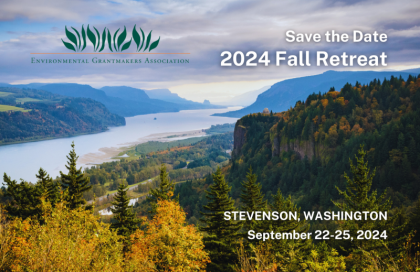Save the Date!
2024 Fall Retreat
Stevenson, Washington
September 22-25, 2024
The 2023 EGA Fall Retreat was a gathering of over 240 members of our community in Montgomery, Alabama. Together, we drew parallels from the rich history of basic rights struggles to today’s movements for racial equity and environmental justice. We invite you to revisit the lessons and member reflections from the 2023 Fall Retreat.
We look forward to seeing you at our in-person gathering in Baltimore, MD, for the 2024 Winter Briefing. The Briefing will take place March 13-14, and is our next opportunity to take decisive action for racial equity, peace, all people, and planet!
EGA’s Journey in Montgomery/The Lands of the Maskoke, Coushatta, and Alabama
Opening Plenary
Ekvn -Yefolecv: Honoring Indigenous Self-Determination as Critical to the Just Transition
EGA convened on the lands of the Maskoke, Coushatta, and Alabama peoples, also known as Montgomery, Alabama, for the 2023 Fall Retreat. Marcus Briggs-Cloud (Maskoke), co-director of Ekvn-Yefolecv, connected the EGA community to our surroundings with a land acknowledgement and a song.

Marcus Briggs-Cloud brings presence and power to the EGA mainstage opener. Photo by AT Media and Analysis.
During the opening discussion, Marcus shared the journey of the Maskoke peoples from being forcibly removed from their lands 180 years ago to the formation of Ekvn-Yefolecv, a Maskoke ecovillage. Ekvn-Yefolecv is a replicable community model for an Indigenous-led just transition rooted in culture. The Maskoke residents steward the land through language revitalization, natural building, and regenerative agriculture.
“We want to invoke our language here in this space, in Montgomery as it’s colonially known, as our traditional homeland”- Marcus Briggs-Cloud
Further Reading: Marcus Briggs-Cloud (Maskoke), reflects on Ekvn-Yefolecv, as a radical resettlement on lands where their ancestors were forcibly removed from what is colonially known as Alabama and Georgia today. Learn more and support the eco-village here.
Tracing the Legacy of Liberation Movements in Montgomery
Our community deepened learning of Montgomery’s history during visits to the Equal Justice Initiative Legacy Museum & National Memorial, and a history tour from Selma to Montgomery.
Guided by EGA’s Racial Equity POV and the support of space holders from Transformative Change, our community embarked on a self-guided walk through the EJI Legacy Museum. The experience encompassed over 400 years of global history from slavery to mass incarceration today. Members were supported in processing our collective history in affinity spaces after the visit, and a Healing Race Portal led by Rev. angel Kyodo williams. Read member reflections on this life-altering experience:

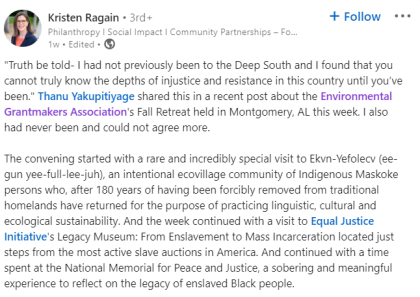
EGA members reflect on their Fall Retreat experience in Montgomery.
On the Selma to Montgomery History Tour, we retraced the footsteps of the Civil Rights Movement. Portia Shepard, Executive Director of Black Belt Women Rising, welcomed our community to her organization’s headquarters at the last stop of the tour. Portia shared connections from the Civil Rights Movement to the Black Belt’s current environmental justice fights against coal ash pollution, landfills, and toxic runoff. These efforts are currently being threatened by SLAPP Suits which punish people for speaking out against injustice.
Take action: Learn more and support Black Belt Women Rising. The nonprofit is addressing environmental injustice in Alabama’s Black Belt, including inadequate access to healthy food and transportation, air and water pollution, and unsafe homes.
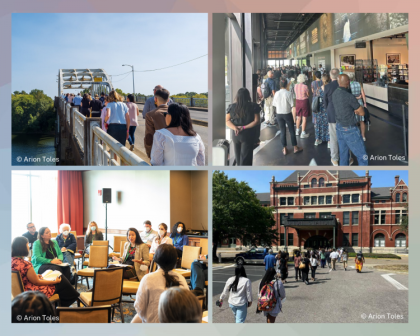
Left to right, top to bottom: (1) EGA members walk across the Edmund Pettus Bridge (2) Visit the Equal Justice Initiative Legacy Museum (3) In conversation (4) Walk to Union Station. Photo by AT Media and Analysis
Resourcing for Racial Equity & Reparative Environmental Movements
Building on our experiences in Montgomery and lessons from local leaders, we examined philanthropy’s role in resourcing local to global movements for justice. Chung-Wha Hong, EGA Board Member and Co-Executive Director of Grassroots International facilitated a discussion with Konda Mason of Jubilee Justice, Miriam Miranda of OFRANEH, and Samir Doshi of the CS Fund.
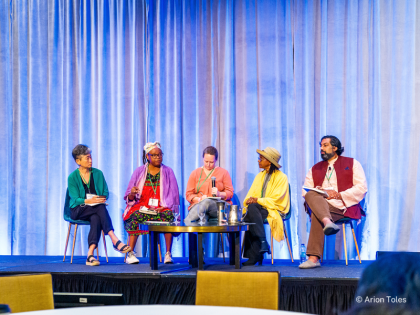
Photo by AT Media and Analysis.
Key Takeaways
- Sustain and increase direct resourcing to BIPOC-led climate justice efforts. Less than 2% of environmental and climate funding goes to BIPOC organizations, and less than 4% of all climate funding goes to climate justice work. Funders can flip these statistics to empower our communities in the ways that they are asking of us.
- Reframe who we are responsible to: Fund with frontline communities’ context as our context, their hurt and needs as our hurt and needs, their vision as our vision for liberation.
- Partnership for power shift. Funders and grantees must work together to challenge unequal relationships. Feedback loops are one practice that can support accountability to grantees.
- Do the internal work to build meaningful global solidarity. The Global North has caused immense devastation to the Global South, from the advent of slavery to present-day exploitation of peoples and lands for resources. These are relational harms by people, policies, and structures we still live under today. In order to facilitate a just transition of our interdependent systems, it requires that we address relational harms by engaging in inner and collective healing work.
EGA Board Members Put Racial Equity in Perspective: “It’s Racial Equity or the Apocalypse”
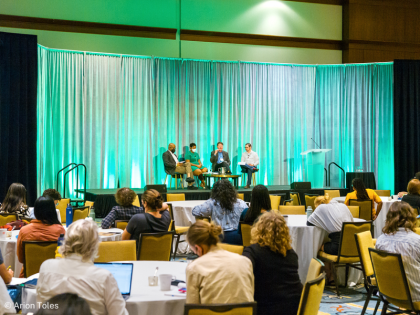
EGA Board Members in discussion with Tamara Toles O’ Laughlin, EGA President and CEO, Photo by AT Media and Analysis.
EGA Board Members, Ed Miller of the Joyce Foundation, Louis Gordon of the Seventh Generation Fund for Indigenous Peoples, and trellis stepter of the Mertz Gilmore Foundation, shared the funder imperative for practicing racial equity in philanthropy.
Steps for Funders to Take Meaningful Racial Equity Action:
- Learn from movements. Philanthropy allows us to learn across movements and programs. The sector encourages us to think outside the box. Apply innovative learnings from one movement to other movements, to strengthen the whole ecosystem.
- Operationalize the EGA Racial Equity Point of View. Share this resource with your peers across programs and foundations. EGA’s Racial Equity Point of View (REPOV) is our collective guide for re-examining internal processes and grant-oriented decision making towards racial equity.
- Collaborate with other funders for more effective change. Advancing racial equity is relational work with ourselves and our peers. When we collaborate with other funders, we also build legitimacy around racial equity issues to overcome internal barriers.
- Resourcing opportunities in the environment to advance the REPOV:
- The Sage Wind Farm Project is an innovative and replicable renewable energy model for public power that prioritizes people, land, and nature over profit. The project is led by and for the Standing Rock Sioux Tribe, and informed with the highest level of cultural and ecological guidance.
- Energy justice: Funding is needed to deploy solar for all types of initiatives, with a focus on the distribution of energy efficiency dollars to low income communities.
- Grow youth-led organizing, and support the next generation of leaders for sustainable and informed movements.
Environmental Justice for Rural Communities
We furthered our learnings in place during a discussion with National Book Award-Winning Author and 2023 MacArthur Fellow, Dr. Imani Perry.
Dr. Perry threaded the role of the environment to peoples’ livelihoods in the South. Underserved rural communities in the South are challenged by a lack of basic resources and land dispossession. The experience of living under limited resources contributes to communities’ organic orientation towards sustainability. Yet, resource-poor communities are often shamed for their practices of sustainability. We need to redirect how we think about sustainability in the South on a social scale.
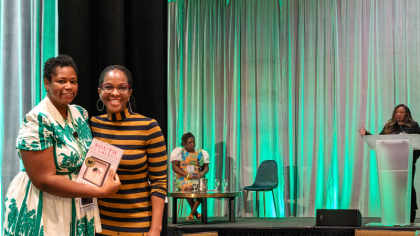
Left to right: (1) Tamara Toles O'Laughlin with Dr. Imani Perry. (2) Ogonnaya Dotson Newman, EGA Board Member and Senior Program Officer at The JPB Foundation and Catherine Coleman Flowers, Founding Director of CREEJ. Photos by AT Media and Analysis.
Catherine Coleman Flowers, Founding Director of Rural Enterprise and Environmental Justice (CREEJ), further dug into the environmental justice issues experienced by rural communities of color. Failing septic systems are contributing to a public health crisis in Alabama’s Black Belt. A majority of Black residents live in the Black Belt region, many of whom are descendants of enslaved peoples. Environmental injustice in the Black Belt is a stark example of white supremacist design continuing to negatively affect Black communities nearly two centuries after slavery was abolished.
Key Takeaways
- Check your assumptions. Deepen your understanding of the environmental challenges specific to the rural South. Connect with local residents. Take the time to learn about the infrastructure in rural South communities and their environmental impacts.
- Support on all levels. Support local organizing and groups leading regional solutions in the rural South - such as CREEJ and Black Belt Women Rising.
- Fund the grant writers. Frontline community organizations need grant writers to help access federal funding. Support local organizations with capacity building to access federal opportunities.
Mobilizing $4 Trillion Dollars in Federal Resources to Movements
We closed our Fall Retreat with an examination of the current trillion-dollar federal funding landscape and how to support the deployment of federal dollars to movements. Helen Chin of the Communities First Fund, Ajulo Othow of EnerWealth Solutions, and Valencia Gunder of The Smile Trust discussed what movements need at this moment and current federal resourcing opportunities.
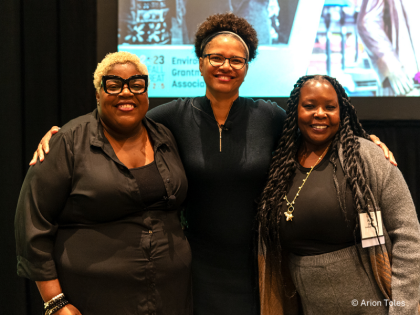
Left to right: Valencia Gunder, The Smile Trust, Helen Chin, Communities First Fund, Ajulo Othow, EnerWealth Solutions. Photo by AT Media and Analysis.
“All the issues we fight mean nothing if we don’t have an earth to inhabit” -Valencia Gunder, The Smile Trust
Key Takeaways
- Support local emergency response organizing for climate disasters. Organized communities are resilient communities. Community members are trusted first responders during climate disasters.
- Reframe the framework of disaster response. There are organizations who do not consider environmental and climate justice as tied to disaster response which lessens the impact of resource distribution. As movers in philanthropy, we must redirect the disaster response framework to include environmental and climate justice.
- Help communities build capital. Support communities with landing federal resources. Funders can support existing funds already doing this work with communities. Or, if you want to take a more direct approach, deploy program-related investment (PRI) dollars to stack needed capital. A major gap area is resourcing capital to poorer rural communities to participate in renewable energy development.
Celebrating the Inaugural Winners of the EGA Awards
At our 2023 Fall Retreat, EGA unveiled two new awards that honor environmental grantmakers for their efforts in leading philanthropic initiatives for people and planet. This year, with your nominations, we selected the inaugural winners of the Donald K. Ross Founders Award and the EGA Risk Taker Awards.
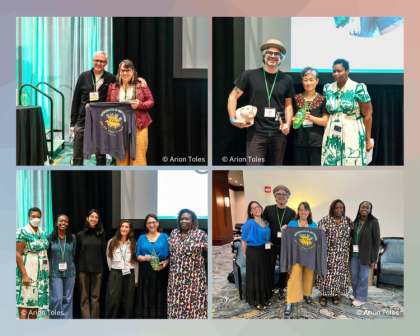
Photos by AT Media and Analysis.
Congratulations to the winners! Watch the full awards ceremony here.
Inaugural Donald K. Ross Founders Award Winner: Adelaide Park Gomer, President of the Park Foundation
Inaugural Risk Taker Award in the category of Visionary/Individual Winner: Farhad A. Ebrahimi, Founder and President of the Chorus Foundation
Inaugural Risk Taker Award in the category of Visionary/Team Winner: The JPB Foundation Environment Program
EGA in Community!
Dinners, Dancing, and Delights
Cultivating joy is essential to sustaining the work we do everyday together. We are so grateful to be in community with you!
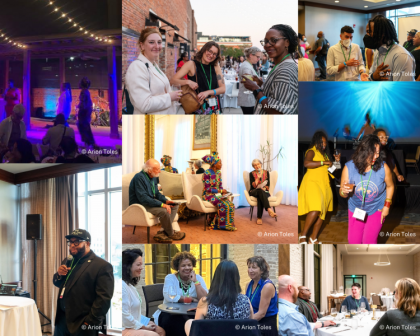
Photos by AT Media and Analysis
EGA thanks our Fall Retreat Program Committee Members for their dedication and intentional vision to the 2023 Fall Retreat!
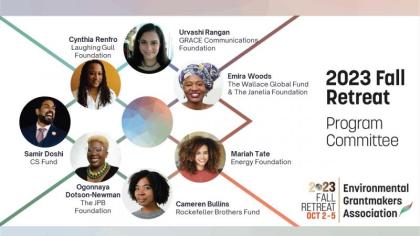
Thank you to the 2023 Fall Retreat Program Committee: Co-Chairs, Emira Woods and Cynthia Renfro, EGA Board Liaison, Ogonnaya Dotson Newman, and Urvashi Rangan, Samir Doshi, Cameren Bullins, and Mariah Tate!
EGA staff thanks you for attending the 2023 Fall Retreat! We look forward to seeing you at our upcoming 2024 Winter Briefing and Fall Retreat. Please save the dates below!
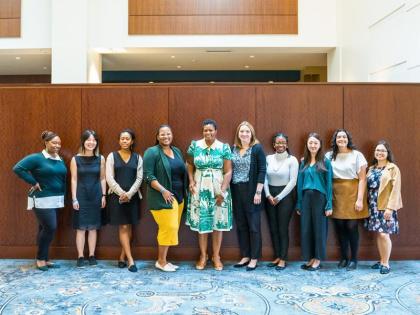
Photo by AT Media and Analysis
Register Today!
2024 Winter Briefing
Baltimore, Maryland
March 13 - March 14, 2024
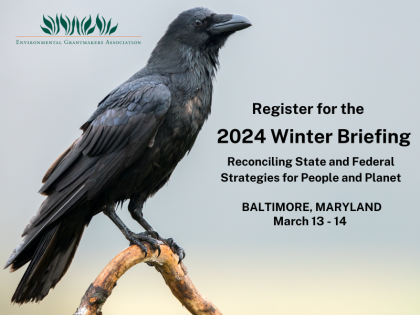
Add to Calendar
2024 Fall Retreat
Stevenson, Washington
September 22-25, 2024
